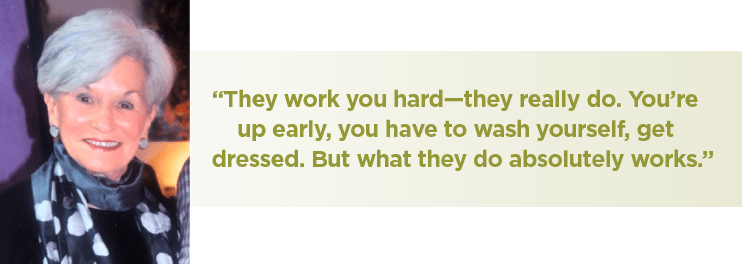Retired fundraiser and 79-year-old Pittsburgh native Judy was away in Florida when she developed crippling headaches in the back of her head and neck. After a stressful return home due to COVID-19 restrictions in May 2020, Judy passed out from her pain. She had a telemedicine visit with the UPMC Headache Center the next morning, at which the doctor suggested she get an MRI as soon as possible.
The MRI was taken soon after at UPMC Mercy, and when the radiologists saw the results, they admitted Judy to UPMC Presbyterian immediately. The MRI showed that the pain was caused by a mass on Judy’s brain stem, one that they feared could be malignant given her battle with breast cancer 20 years earlier. Fortunately, the mass was found to be benign, but the battle was far from over. Judy required two surgeries and extensive rehabilitation before returning to her active life.
UPMC Department of Neurosurgery
“I had two fabulous surgeons,” says Judy.
Separated by only two days, she underwent two procedures in the UPMC Department of Neurosurgery. The first was a mass removal, performed through the nose (Endoscopic Endonasal Approach pioneered by UPMC) by Georgios Zenonos, MD, a doctor Judy valued greatly during her journey to recovery.
“He checked on me every single morning and night,” Judy says.
The second surgery, a cervical procedure to insert rods and stabilize Judy’s neck, was performed by David O. Okonkwo, MD, PhD.
But this is where her story takes an unexpected turn. While there is always swelling after any surgery, including around the breathing tube, it isn’t often severe. However, the amount of swelling Judy sustained didn’t allow her to breathe when they removed the breathing tube after her second surgery.“I have not had a headache since my surgeries—not at all. I couldn’t even stand up from the pain beforehand, so for me, this was a miracle,” Judy says.
UPMC Rehabilitation Institute
What followed was an emergency tracheostomy to allow Judy to breathe. And a few days later, she got a feeding tube as well. This resulted in her temporary inability to speak or swallow, which led her to the UPMC Rehabilitation Institute for inpatient rehab at UPMC Montefiore. This is where she would stay and steadily progress for two weeks. Her inpatient rehab would include speech, physical, and occupational therapy and test both her mental and physical strength.
“Carla, Ari, and Gabby were just lifesavers in rehab—they were wonderful,” Judy recalls.
Carla J. Maiolini, MA/CCC-SLP, CBIS, was by Judy’s side daily placing a speaking valve on the trach for increasing lengths of time as she learned to breathe and speak again, as well as walking her through exercises that would help her swallow. Meanwhile, physical therapist Ari Silbermann helped Judy walk on her own and increase her strength, and occupational therapist Gabby Mickey helped Judy perform activities of daily living. She describes that when she was able to speak ever so slightly again, she really saw this had potential to turn out well.
Carla helped Judy perform tongue depressor drills and hand/chin exercises to teach her how to swallow again. She even accompanied her to her many difficult swallowing tests—the first of which didn’t go so well, but after more practice, the second was a great success.
“There were days when I knew my therapists were coming and I thought, ‘oh gosh I can’t do this today’, but somehow I could. They have a manner that gets you through. They’re encouraging and kind. They work you hard—they really do. You’re up early, you have to wash yourself, get dressed. But what they do absolutely works,” Judy says.
Kali Webb, DO, was the physical medicine and rehabilitation attending physician on the rehab unit with her. She recalls this experience, sharing,
“Judy was a delightful, kind-hearted patient. She put a lot of hard work into therapies, both at her sessions and during her free time, which led to great success for her recovery.”

A Team of Lifesavers
Judy’s list of lifesavers in recovery and rehabilitation goes on. From an aide she looked forward to seeing every day, who was so incredibly kind and helped her get into her gown each night, to a nurse on H in UPMC Presbyterian who was “just incredible” and encouraged her every step of the way—Judy’s appreciation for the staff is beyond what words can express…even after all she’s been through.
After discharge from UPMC Montefiore in June, Judy returned home with her husband—feeding tube still intact—and was seen by visiting nurses and a dietitian. She describes how “unbelievable” her children and grandchildren were during the entire journey, and especially during this leg of the race. They took turns being tested for the coronavirus and visiting to help take care of her one week at a time.
She continued to improve with the support of those around her and visited the hospital to have her feeding tube removed in August. What started as a cautious food journey with ice cream, tapioca, and other soft foods ended with the best cheeseburger Judy has ever eaten in mid-September 2020. There were foods she attempted to incorporate that didn’t always work, but the day she decided she wanted a burger, she was able to eat the entire thing. Although still approaching her food intake cautiously, she’s never had to turn away from solid food again.
Judy loves to cook and shares that she knew she was really feeling better when she started to do that again.
“Now I can eat just about anything, but I have to be careful. And I can speak. My voice is a little raspy, but it always kind of has been. I’m pretty much back to normal,” says Judy.
“I would say in general, my care was unbelievable. Everyone was just fabulous. For a very difficult experience to go through, it was as good as it could possibly have been.”
This patient's treatment and results may not be representative of all similar cases.
















